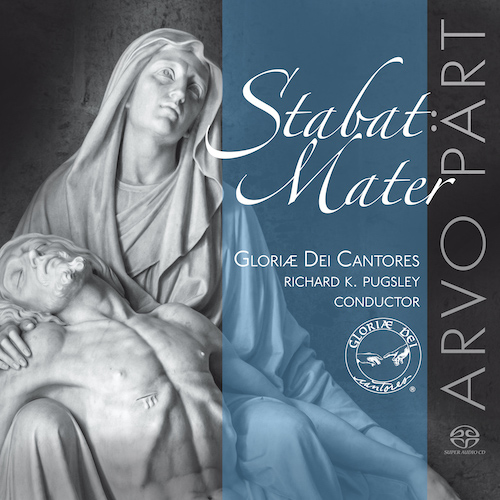Cape Cod chorus disc offers ideal introduction to Arvo Pärt

Arvo Pärt, Stabat Mater. Gloriae Dei Cantores GDCD 065
When he emerged from an artistic crisis in the late 1970s, Arvo Pärt set upon a course that would make him one of the most performed of living composers. Forty years on, at age 84, the prolific Estonian composer remains at the height of his powers, continuing to compose music that reflects his broad yet personal spirituality.
That is the essence of Stabat Mater, a new album released by Gloriae Dei Cantores led by music director Richard Pugsley on their own label. The recording brings together six works that Pärt composed over the last three decades, and the expert performances by the Cape Cod-based chorus reveal every subtlety of the composer’s unique style.
Many of the works on this disc are based upon sacred texts that reflect a traditional religious praise Jesus Christ and Mary, as well as lesser-known church leaders. And Pärt’s music, with its resonant harmonies and chant-like melodies, only enhances the mystery and timelessness of his spiritual inspiration.
The twenty-five-minute Stabat Mater (2008) originated as a commission for the 100th anniversary of Alban Berg’s birth. The text’s tale of Mary standing at the foot of the cross witnessing a dying Jesus, as heard here, is neither stiffly pious nor melodramatic. The chorus’s spare lines and stretches of silence instead convey a sense of loneliness and desolation. Like flowers in a desert, the string orchestra brings brief moments of animation before fading into the ensemble’s sumptuous blend.
L’abbé Agathon (2004, rev. 2008) is a short choral cantata for female voices, soloists, and strings that tells of a wandering priest and his encounter with a leper. Here too, Pärt uses silence as a dramatic tool, and the female chorus delivers its lines with radiance and delicacy. With his smoky baritone, Alexander Pugsley makes a stalwart Agathon, while Rachel McKendree brings her gleaming soprano to the role of the leper (who, the text reveals, is actually an angel).
Pärt composed his Salve Regina (2002) for the 1,150th anniversary of the Essen Abbey in Germany. Scored for organ and mixed choir, it is a meditation on the familiar Marian prayer. Here, the singers work their way through Pärt’s score with the grace of a chamber ensemble, trading phrases midline for intricate hocket effects. Other passages reveal the full powers of the singers, which together unfold the lines with sweep and assurance. Organist James E. Jordan is a constant presence, and he supports the singers with gentle harmonies.
The singers treat the celebratory text of Pärt’s Magnificat (1989) with intimacy more than revelry. The harmonies here are so finely tuned that the overtones themselves become part of the musical fabric. Gloriae Dei Cantores, with its fine tone and resonance, excels at such passages and delivers phrases that swell into resplendent statements. Pärt’s well-placed dissonances, also handled elegantly by the chorus, bring a nicely tart asperity to the blend.
The Cantores singers’ reading of Nunc dimittis (2001) takes on the solemnity of a personal prayer. The chorus makes a strong case for Pärt’s skills as a word-painter, mixing their voices in bright chords whenever the text tells of holy light. But the work never achieves a traditional sense of finality. Left unresolved, the final harmonies seem to carry the tension beyond the scope of the composition itself, and the singers deftly fade their voices into the concluding silence.
Pärt scored his Peace Upon You, Jerusalem (2002) for women’s voices, and here the singers seize the opportunity for a more ebullient style. With the qualities of a vocal fanfare, the choir delivers the psalm setting with excitement and tender warmth. Pärt’s music, this rendering suggests, is ultimately an expression of adoration.
With superb sound quality, the recording captures the fine acoustic of the Church of the Transfiguration, where the works were recorded. Conductor Richard Pugsley reveals the details of each composition with a rare sensitivity and luminosity. The liner notes by James E. Jordan highlight the context and interpretive detailing that Pugsley and the ensemble bring to each score.
Recordings of the composer’s works may be abundant. Yet this disc, with its combination of familiar and unfamiliar repertoire, makes an ideal introduction for listeners eager to explore Pärt’s unique voice.
Stabat Mater can be purchased for $19.99 or downloaded from the Gloriae Dei Cantores website. gdcrecordings.com
Posted in Performances



